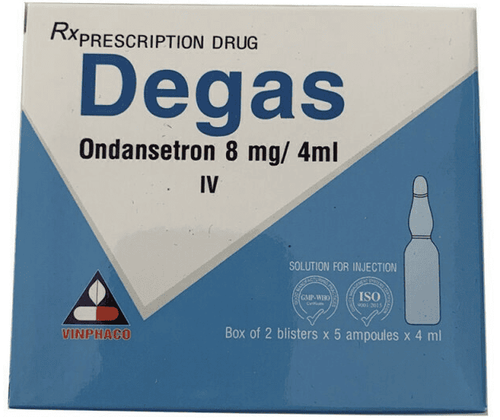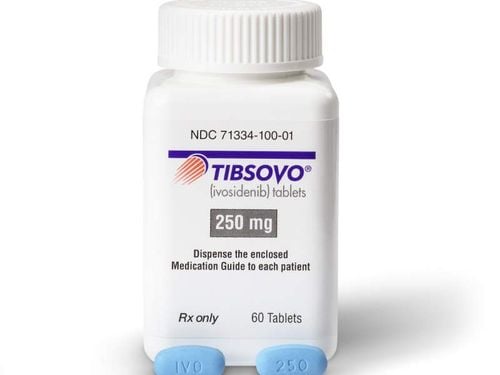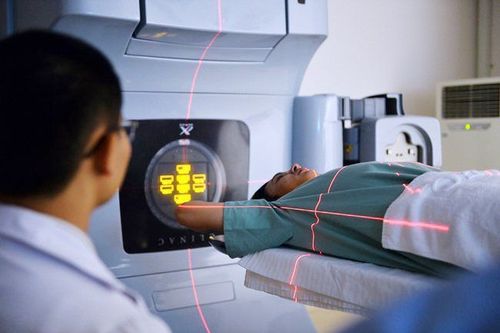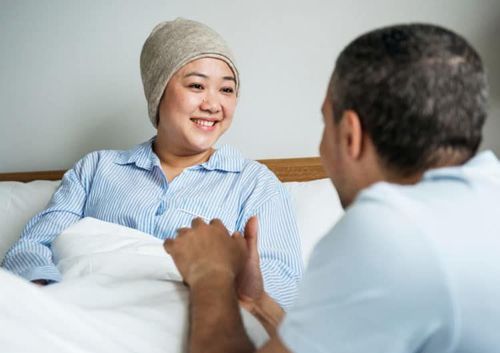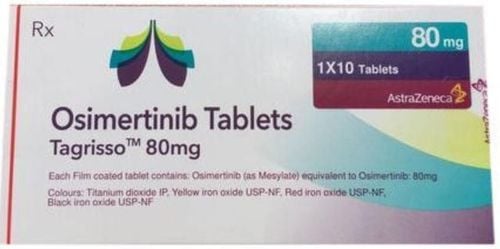This is an automatically translated article.
Posted by Specialist Doctor II Bui Le Phuoc Thu Thao - Radiotherapy Doctor - Oncology Center - Vinmec Central Park International General Hospital. The doctor has nearly 15 years of experience in direct treatment of cancer patients, especially radiation oncology and care for terminal cancer patients, palliative care and pain relief.Radiation therapy is a commonly prescribed method to treat cancer, based on the destructive and destructive effects of high-energy radiation rays on cancer cells. Patients undergoing radiation therapy for cancer will experience side effects such as nausea, hair loss, pain after radiation therapy, etc. Letters are essential.
1. Learn about radiation therapy for cancer
Radiation therapy is now used a lot in cancer treatment, it is similar to surgery in that local treatment should only affect a certain location in the patient's body. When conducting radiation therapy, high-energy radiation beams such as X-rays, Gamma rays, electron beams, protons, etc. will attack and destroy cancer cells on the patient's body.Radiation therapy can be indicated for radical treatment in some cancers, for example early head and neck cancer. Or radiation therapy is indicated as a treatment modality in a multimodal combination treatment regimen for the treatment of many cancers. For example, radiation therapy is indicated as adjuvant therapy before and after surgery to facilitate surgery, increase the chance of functional preservation surgery, or reduce the risk of local recurrence and distant metastasis after treatment. Or radiation therapy combined with chemotherapy, increasing the effectiveness of treatment. Radiation therapy is also indicated for symptomatic relief to improve the quality of life of patients with advanced cancer, for example, radiation therapy to relieve pain, radiation therapy to relieve compression, radiotherapy to stop bleeding, radiotherapy to relieve pain. Pressure....
Radiation therapy for cancer can be carried out in many different ways such as: brachytherapy, external radiation therapy, using radiopharmaceuticals to introduce radioactive sources into the patient's body and to kill cells. cancer cells eg radioactive iodine isotope for thyroid cancer treatment.
During the entire process of cancer radiation therapy, the patient will be treated and cared for by a team of medical professionals, including:
Radiotherapy specialists: Highly qualified, trained people In order to treat cancer with radiation, a radiotherapy specialist will be the main person responsible for the patient's radiation therapy plan and process. Medical Physiotherapist: Those who will ensure the quality of radiation therapy equipment, control the radiation therapy machinery and equipment to deliver the correct dose of treatment according to the treatment regimen given by the doctor, and at the same time support Assist the radiologist in planning the treatment and care of the patient after radiation therapy. Radiotherapy technician: A person who operates radiotherapy equipment and helps patients with radiation therapy on a daily basis. Radiotherapy nursing: Helps patients capture information about radiation therapy as well as monitor side effects such as ulcers after radiation therapy, pain after radiation therapy or nausea, hair loss in patients, In addition, the process of care Post-radiotherapy is also performed by nutritionists, health care professionals or other physical therapists.
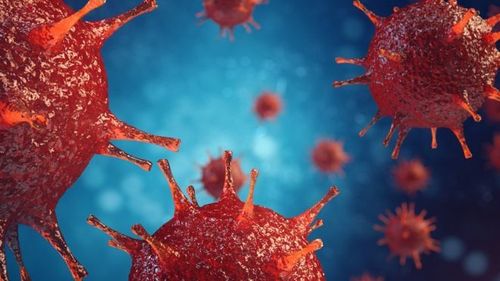
2. Notes when taking care of cancer radiation patients
Radiation therapy may cause some therapeutic toxicity.Early toxicity group, also known as acute toxicity: appears while the patient is being treated, lasts a short time after treatment and usually improves gradually. This group usually affects organs/tissues with short-lived, frequently changing cell types, e.g. on mucosal skin cells, intestinal mucosal cells, causing dermatitis, mucositis, abdominal pain, nausea, diarrhea, cystitis. The second group of therapeutic toxicity is late or chronic toxicity. This group can range from early toxicity, which does not improve after treatment and persists afterward, or toxicities that appear months to years later after treatment. For example: affecting the connective tissue, causing soft tissue fibrosis, affecting the teeth and bones, causing tooth decay, causing osteonecrosis, stiffness, and tight jaw; affecting nerve tissue, causing brain necrosis, endocrine disorders (hypothyroidism after radiation therapy), blurred vision, blindness, damage to the lining of the gastrointestinal tract causing hemorrhagic inflammation, causing atrophy - callus esophagus after radiation therapy) causing intestinal perforation, causing fistula (vesicorectal fistula, vaginal-rectal fistula...) Therefore, care for patients after radiation therapy for cancer needs to be well done before, during and during the treatment. and after radiation therapy.
2.1. Notes when taking care of patients before radiation therapy
Before radiation therapy, patients should be well prepared psychologically, avoiding stress and fear. In particular, it is necessary to supplement with adequate nutrients to enhance physical strength, improve the local situation, and minimize local inflammation.2.2. Notes when taking care of patients during radiation therapy
During radiation therapy, if the patient shows signs of poor appetite, bleeding, pain, etc., it needs to be treated promptly. At this time, doctors will pay attention to adjust the treatment method and drug dosage, protect the parts that do not need to be irradiated, and will give the patient B vitamins and sedatives. Next, caregivers of cancer patients need to help the patient's body absorb enough water to reduce body reactions and avoid local damage from radiation therapy.2.3 Notes when taking care of patients after radiation therapy
Caring for patients after radiation therapy is an extremely important step, affecting the health recovery process and the effectiveness of treatment.Pay attention to the skin after irradiation that needs to be cleaned, minimize chemical and physical stimulation, avoid rubbing, otherwise ulceration will occur after radiation therapy.
For specific local radiotherapy such as esophageal radiation therapy, after radiation therapy, the patient needs to eat soft foods. Rectal radiation therapy needs to find ways to avoid constipation....
Patients need to be supplemented with adequate nutrients, rest properly to strengthen resistance, recover health for the next rounds of radiation therapy. follow.

3. When to contact a doctor for radiation therapy for cancer?
Patients undergoing radiation therapy for cancer need to monitor their health carefully. They must immediately notify the treating doctor when they have symptoms such as:Pain after radiation therapy does not decrease, especially pain always in one location. Abnormal tumor appearance Vomiting, nausea after radiation therapy, diarrhea, poor appetite Continuous high fever Skin rash or abnormal bleeding In addition, patients after radiation therapy for cancer need to be examined, according to the doctor. Regular health monitoring to ensure health and safety. Currently, Vinmec Times City International Hospital and Central Park International Hospital apply modern radiation therapy methods, with many high techniques, well-trained and experienced specialists. . Modern equipment at Vinmec Central Park Hospital can be mentioned as TrueBeam Radiation Therapy Machine (Varian Company, USA), Discovery RT Simulation CT Scanner System (GE - USA), Eclipse v15 Radiation Therapy Planning System .6 (Varian company - USA), Q-fix fixation kit made by the US...and especially, at Vinmec Central Park, the radiotherapy team has mastered most of the basic radiotherapy techniques. to advanced techniques in the world such as 4D - Synchronized breathing, VMAT, SBRT.... bring successful treatment results for hundreds of cancer patients, minimizing side effects due to the process. caused by radiation therapy.
The palliative care program applied at Vinmec Central Park will help patients participate to receive appropriate care, get rid of pain and other uncomfortable symptoms. Patients not only receive medical care and treatment, but also improve their quality of spiritual life, optimistically face diseases, thereby improving the effectiveness of disease treatment.
Please dial HOTLINE for more information or register for an appointment HERE. Download MyVinmec app to make appointments faster and to manage your bookings easily.





